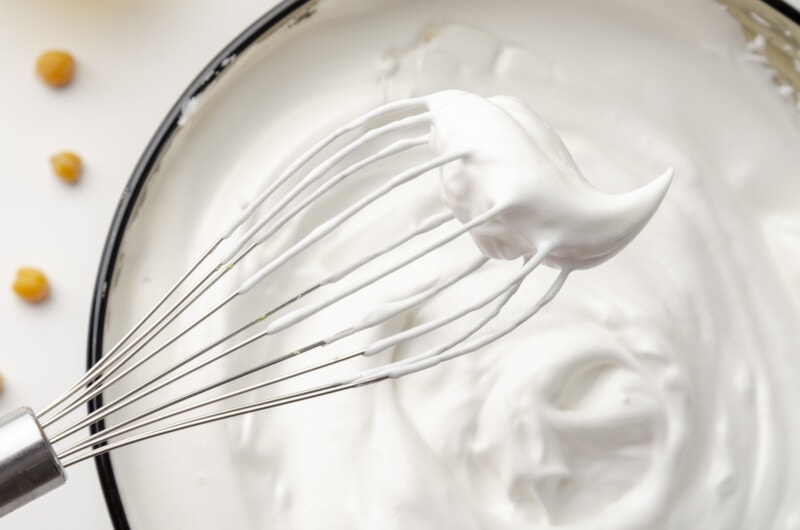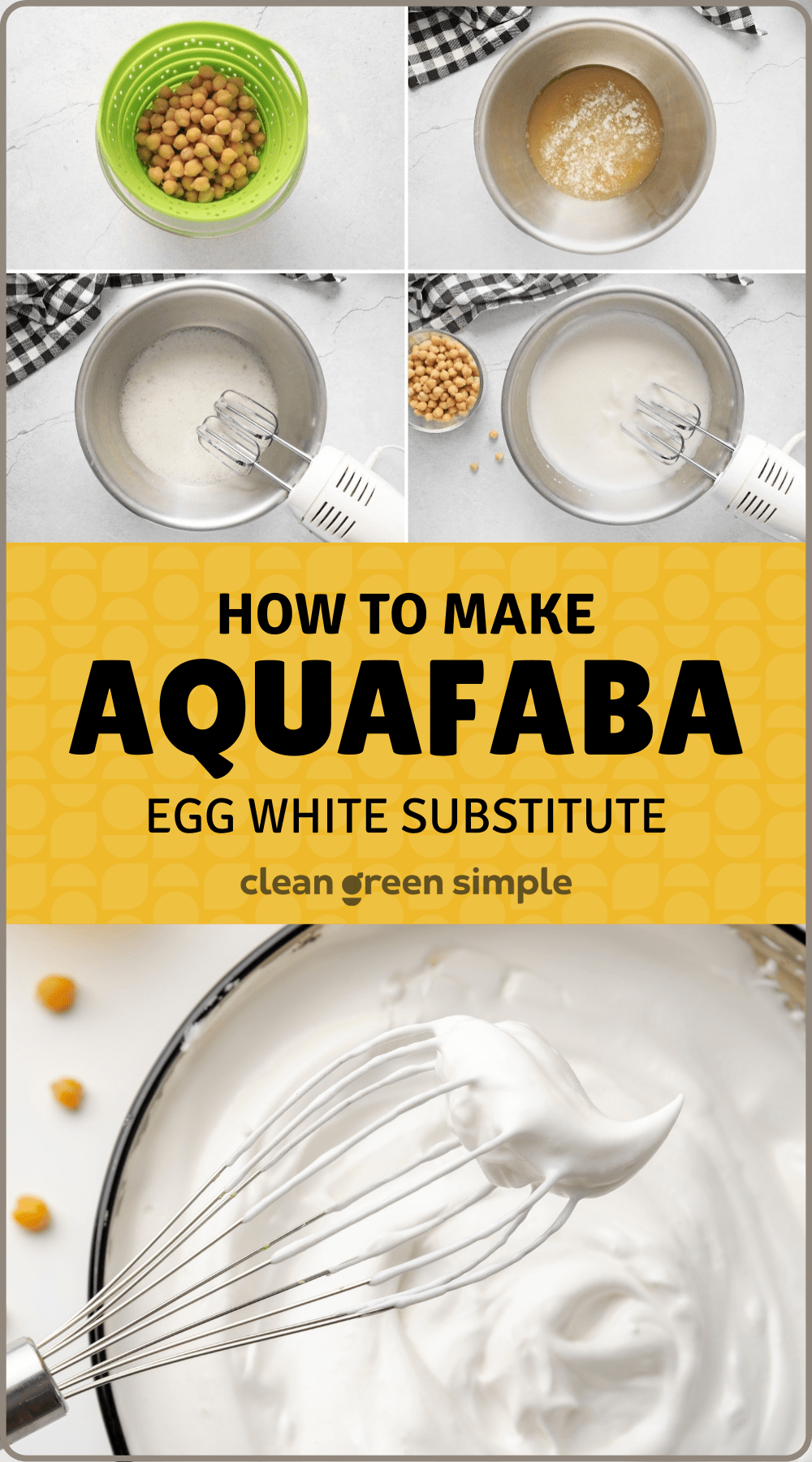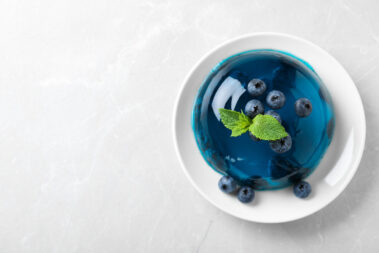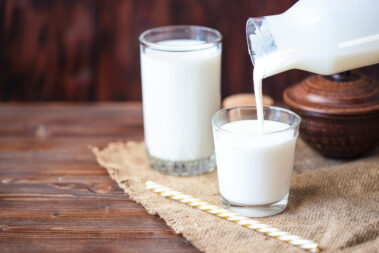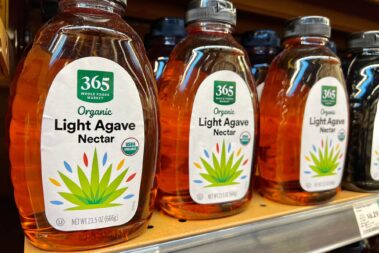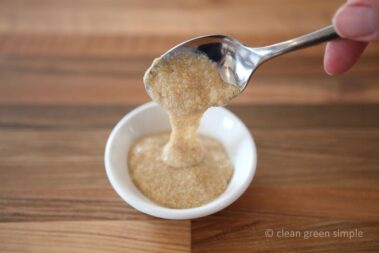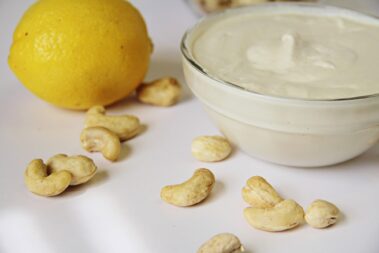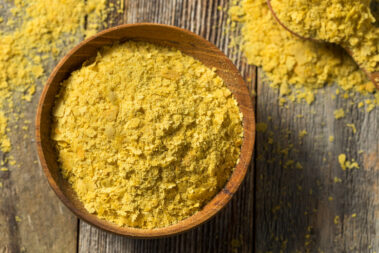Egg whites are a common ingredient in many foods, from baked goods to cocktails. Find out how to substitute egg whites with these five vegan egg white substitute options, including our favorite, aquafaba.
We’ll tell you how to make these simple alternatives and which recipes they work best in.
Table of Contents
The 5 Best Egg White Substitutes
Whether you are vegan, allergic to eggs, or just cooking with a bare pantry, these five egg white substitute options are sure to come in handy. Here’s everything you need to know to make these substitutes work in a variety of recipes.
1. Aquafaba
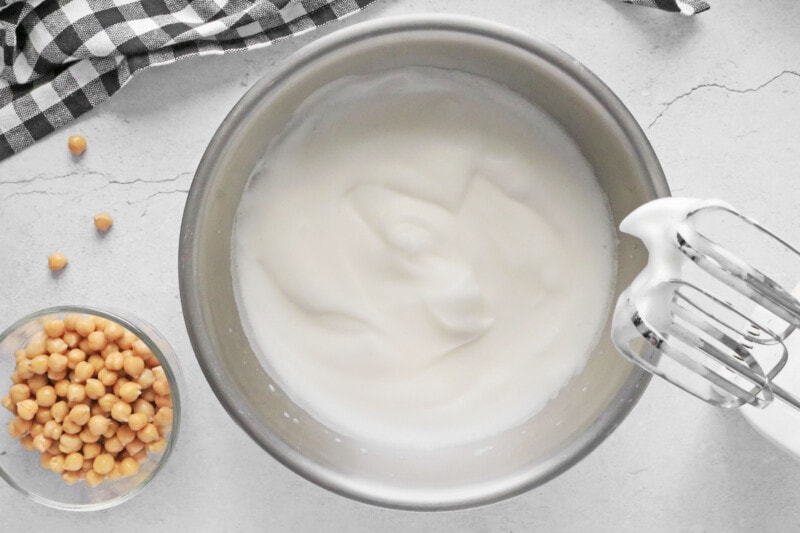
The best egg white substitute is aquafaba. Not only is this substitute vegan, but it comes free with every can of chickpeas! In fact, by opting for aquafaba, you’ll actually be helping to reduce food waste.
So, what is aquafaba?
Aquafaba is the viscous liquid that results from cooking legumes. It’s made up of protein, sugars, and fiber. These nutrients are able to seep into the cooking water thanks to a unique starch gelatinization process that occurs when beans are exposed to boiling water.
Like egg whites, aquafaba is made up largely of protein and has no fat in it. Unlike egg whites, this viscous liquid does have some soluble and insoluble fiber. It’s the soluble fiber and protein that allows aquafaba to hold a meringue-like form when it’s whipped.
Chickpea liquid is the most common form of aquafaba used as an egg white substitute because it has a neutral taste and a lower amount of insoluble fiber, which gives it the right texture to create gels and meringues.
You can find a detailed aquafaba recipe and preparation instructions at the bottom of this article, but here’s a quick run-down:
To use aquafaba as an egg white substitute in a standard baking or savory recipe, simply measure out the amount needed and stir until it’s foamy. For use as a meringue, whip the aquafaba for about 13 minutes until it thickens up.
2 tablespoons of aquafaba = 1 egg white
Aquafaba can also be used as a whole egg replacer in brownies and quick breads. Other great egg replacers for sweet treats like these include mashed banana, unsweetened applesauce, yogurt, and ground flax seeds. You can learn more about the best egg substitutions for vegan baking, here.
Some of these can also be used as dairy-free substitutes for buttermilk.
2. Flax Seeds
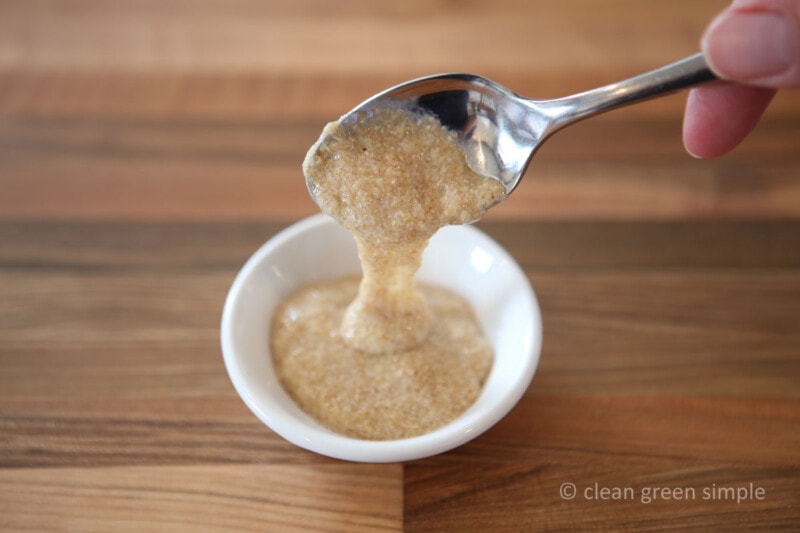
Flax seeds also make a great egg white substitute.
These seeds are well known for their use as a dietary supplement. They are rich in omega fatty acids, including omega-3, as well as B vitamins, iron, and magnesium. They’re also packed with fiber and make for a great constipation treatment.
These tiny, nutrient-rich seeds have a unique outer layer that contains mucilaginous substances. When exposed to water, this material swells and becomes slimy. It forms a binding agent that perfectly mimics egg whites used in baking.
To best emulate the texture of eggs, use fresh ground flaxseed. When mixed with water, ground flaxseed creates a relatively smooth, viscous liquid that binds and thickens to elevate your baking without the need for animal products.
Unlike aquafaba, a flax egg does not whip up into a meringue. It’s best used for baking applications. It has a slightly nutty taste that lends itself well to pancakes, hearty muffins, and grain-heavy cookies and cakes.
½ tablespoon of ground flaxseed + 1½ tablespoons of water = 1 egg white
To create an egg white substitute from flaxseed, mix ground flaxseed with warm water, stir vigorously and allow to sit for at least 5 minutes. If the recipe calls for whole eggs, double the ingredients listed above.
3. Agar Powder
Another great egg white substitute is agar powder.
Agar, also called agar-agar, is harvested from certain kinds of red seaweed. When this seaweed is boiled, the viscous liquid that helps support the structure of the cell walls escapes into the water. This water is then dehydrated to create thin, opaque flakes that can be sold as is or ground into a fine powder.
Despite having a low-calorie content, agar is surprisingly packed with micronutrients. It’s high in calcium, iron, and folate. It also contains a lot of fiber–something that real egg whites lack. While not as high as eggs in protein, it does contain some protein per serving.
Most often, this seaweed product is sold as a vegan gelatin replacement. But it also works surprisingly well as a white egg substitute. It’s most often used in desserts such as custard and puddings, but can also be used as a thickener for soups and sauces.
1 tbsp agar + 1 tbsp water = 1 egg white
To make agar into an egg white substitute, mix equal parts water and agar. Whip well and then place the mixture in the refrigerator to chill. For the fluffiest texture, whip the mix again after it has cooled and place it back in the fridge. The more you whip and chill, the fluffier the mixture will become.
4. Xanthan Gum
An egg white substitute that works well in certain situations is xanthan gum.
This white powder is used in many commercial food products as a thickening agent and is similar to cornstarch and arrowroot powder. It’s produced during the fermentation of glucose by the Xanthomonas campestris bacteria. The gooey substance is dehydrated into a fine white powder that quickly turns back into a viscous liquid when it comes in contact with water.
This product is entirely made up of fiber and doesn’t really contain much in the way of other nutrients. But it’s believed to have some health benefits when consumed in large quantities. Studies have shown that it may be effective at lowering blood sugar after meals, lowering cholesterol, aiding in weight loss, and may even fight some cancers.
As an egg white substitute, xanthan gum works both as a thickener and a leavening agent. It’s best used for baking and making ice cream.
¼ teaspoon xanthan gum + ¼ teaspoon water = 1 egg white
To make xanthan gum into an egg white substitute, mix it with equal parts water and allow it to sit until thick. Then whip until the desired consistency is reached. Because a little xanthan goes a long way as a thickener, you may have to adjust the amount of other liquid ingredients in the recipe to make up for the missing liquid that would have been provided by real egg white.
5. Chia Seeds

Chia seeds work a lot like flax seeds and can be used in many of the same situations.
These mucilaginous seeds are harvested from a type of mint called Salvia hispanica. Like flax seeds, a substance on the outer layer of chia seeds reacts to water and forms a sticky, viscous liquid that’s perfect for thickening and binding ingredients in baking.
Chia seeds are highly celebrated for their health benefits. They are high in omegas, calcium, magnesium, manganese, and phosphorus. They also contain a decent amount of protein.
To replicate the smooth texture of egg whites, you’ll want to use ground chia seeds or chia flour.
1 tsp chia seeds + 2 tbsp water = 1 egg white
A little chia goes a long way for making viscous liquid, so you will need much more water than ground seeds. Mix well and allow to sit for 3 minutes. Then whisk vigorously for at least 15 seconds to get the frothy texture needed to replace egg whites.
Quick Reference Chart for Egg White Substitutes
Here are the amounts you will need for each of the above substitutes in order to replace one egg white. You may have to adjust the other liquid ingredient amounts in the recipe to make up for changes in the amount added with the substitute.
| Substitute | Amount Needed to Replace 1 Egg White |
| Aquafaba | 2 tablespoons |
| Ground Flax Seed | ½ tablespoon + 1 ½ tablespoons water |
| Agar Powder | 1 tablespoon + 1 tablespoon water |
| Xanthan Powder | ¼ teaspoon + ¼ teaspoon water |
| Chia Seeds | 1 teaspoon + 2 tablespoons water |
Know the Difference: Egg Whites vs. Egg Yolks
There’s a reason some recipes call for only egg whites instead of whole eggs. This has everything to do with the differences in the macronutrient makeup of these two parts of the egg.
Most of the nutrients and all of the fat in eggs come from the egg yolks. These yolks are also high in vitamin D, choline, zeaxanthin, lutein, selenium, and many essential amino acids. There are also 2.7 grams of protein in the average egg yolk.
But the vast majority of the protein found in an egg is in the uncolored portion. Compared to the yolk, the nutritional value of egg whites is much lower. But their high protein content makes them valuable in the kitchen.
When egg whites are beaten and whisked, the proteins in them are denatured and coagulated, causing foam to form. This foam can be used for a variety of different applications depending on the extent of the coagulation and firmness of the final product.
Suitable replacements for egg whites are different from substitutes for whole eggs because they need to mirror these unique physical characteristics.
Alternatives: Commercial Vegan Egg White Products
If you want to make things even easier on yourself, you can always reach for a commercial vegan egg white substitute product instead of making your own.
There are a decent number of options here. However, it’s worth noting that most are whole-egg substitutes, not specifically egg white. But depending on what you need the substitute for, they may still work.
Here are a few of my favorite products:
- AcreMade Plant-Based Egg Baking Replacer – Whole egg substitute made of pea protein.
- Judee’s Vegan Egg Replacer – Gluten-free option that works well as an egg white substitute for many baking recipes.
- Vör Vegan Meringue Powder – Aquafaba-based vegan egg white substitute that actually works to make meringue.
FAQ
Can you substitute egg whites in cocktails?
Yes, you can use vegan egg white substitutes when making cocktails too! For this, we recommend aquafaba for its thin, eggy consistency and mild flavor.
Can you buy aquafaba?
Yes, you can buy aquafaba—in fact, it comes free in all cans of plain beans. If you’d rather buy aquafaba a la carte, you’re in luck. A few companies have started selling just this viscous liquid. You can even buy it as a rehydratable powder from a company called Vör.
Is aquafaba only from chickpeas?
Aquafaba is most commonly associated with chickpeas, but the word actually refers to the viscous liquid that is produced by cooking any type of legume. In terms of egg substitutes, chickpea and yellow split pea broth work the best due to their consistency, composition, and neutral taste. But liquid from any type of bean would work in a pinch (especially in savory recipes).
Can I make my own aquafaba?
Yes you can. Aquafaba is just the liquid that results from boiling beans, so all you have to do to make your own is cook up some dry chickpeas. We recommend soaking dried chickpeas in water overnight, rinsing them, then cooking them in a pressure or slow cooker with enough water to cover them by about 2 inches.
Can you buy egg white substitute?
Yes, commercial egg white substitute is available at most stores. These pre-made products are great for those with an egg allergy. These are typically made of potato starch, tapioca starch, or another binder. However, some options utilize silken tofu.
While these store-bought products are easy to use and allergy-friendly, they are often more expensive than homemade options like those listed above.
Our Favorite Recipes for Vegan Egg White Substitutes
Now that you know how to create useful egg white substitutes, it’s time to put them to use. Here are some of our favorite recipes that are (or can be made) vegan thanks to substitutes like these.
- Healthy Angel Food Cake – This recipe features better ingredients and monk fruit extract for a healthier dessert that tastes as good as the real thing. And if you replace the egg whites with one of our substitutes above, it’s 100% vegan.
- Pisco Sour – This classic cocktail can be made vegan by replacing the egg with aquafaba. We find it a lot more appetizing this way too!
- Vegan Chocolate Mousse – This decadent chocolate mousse recipe uses aquafaba for an amazingly airy result that is egg-free and cruelty-free.
- Meringue Cookies – These tasty, simple meringue cookies are made without refined sugar and can be made fully vegan simply by replacing the egg whites with aquafaba.
If you enjoy these recipes and our helpful vegan eating tips, don’t forget to sign up for our newsletter to receive more content like this delivered to your inbox.
How to Make the Best Egg White Substitute
When it comes to the best egg white substitutes, you won’t find anything better than aquafaba. This viscous liquid is cheap, easy to make, and versatile. It works as a binding agent and can be whipped up to create a meringue.
Here’s our easy-to-follow recipe for preparing aquafaba for use in egg-free meringue, baked goods, and more.
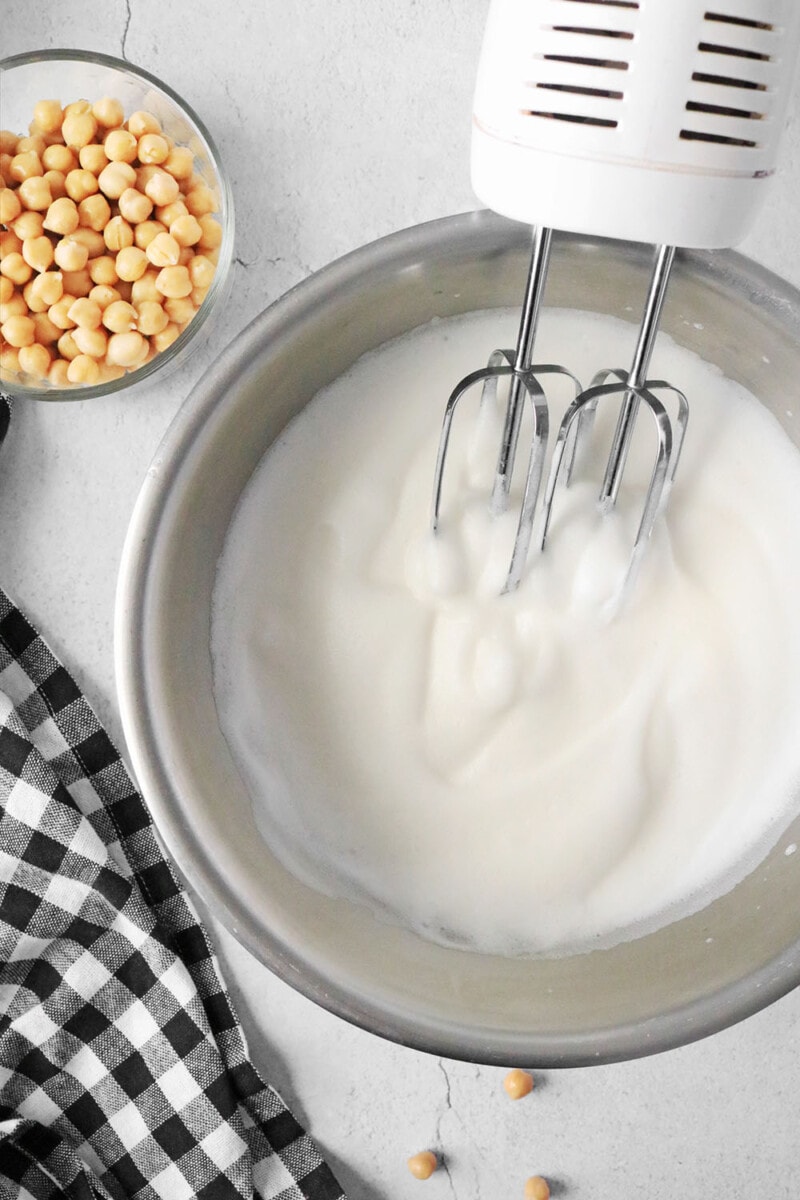
Key Ingredients
- Chickpea brine. This is the thick, gooey liquid leftover from a can of chickpeas—a.k.a. aquafaba. Theoretically, you can also use the liquid from home-cooked chickpeas, but it may be too thin to be used as an egg replacement. The easiest, most convenient option is to use aquafaba from the can.
- Cream of tartar. Though it’s possible to make aquafaba without cream of tartar, this ingredient provides structure and form.
How to Make Aquafaba
To use aquafaba as an egg white substitute, you’ll have to whip it into a fluffy foam. This is easy to do! All you need is a standing or hand mixer. Here are the steps:
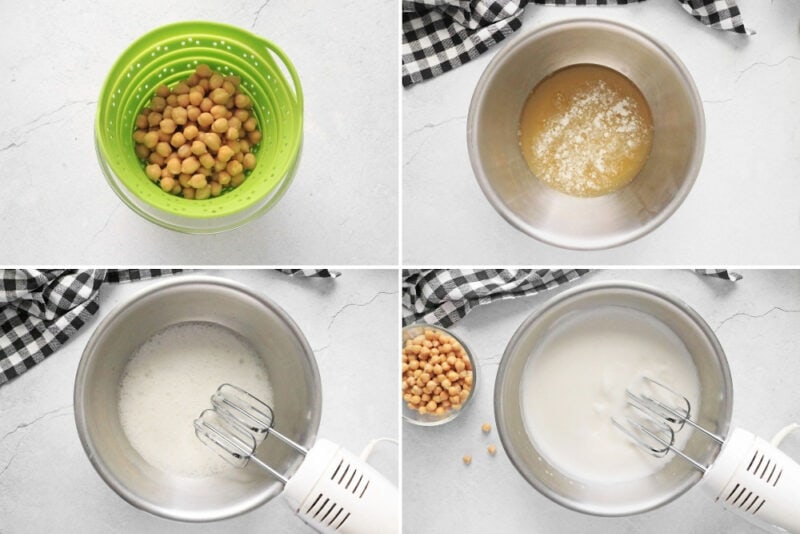
- Place a strainer in a bowl. Pour the canned chickpeas into the strainer, letting the liquid drain into the bowl. One can contains about 3/4 cup of brine. Save the chickpeas for another recipe.
- Combine the chickpea liquid and cream of tartar in a large bowl.
- Whip the liquid with the standing or hand mixer. It’ll start to become foamy and white.
- Continue whipping until the aquafaba reaches your preferred thickness and stiffness. This depends on the specific recipe that you’re making, but generally, this can take anywhere from 3 to 7 minutes.
Egg White Substitutes Made Easy
So there you have it, 5 easy ways to create your own vegan egg white substitutes. Don’t forget to print out our easy reference recipe card for the best egg white replacement, below.
And if you’ve tried any of these egg white substitutes, let us know how you liked them. Post your thoughts in the comments section at the end of this post.
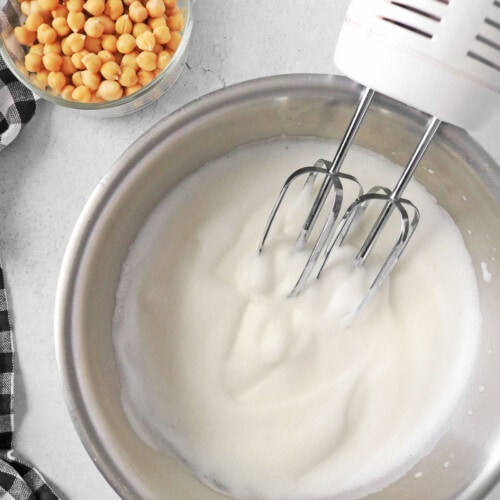
How to Make Aquafaba (Egg White Substitute)
Ingredients
- ¾ cup liquid from can of chickpeas from 1 15-ounce can of chickpeas
- ½ teaspoon cream of tartar
Instructions
- Place a strainer in a bowl. Pour the canned chickpeas into the strainer, letting the liquid drain into the bowl. Save the chickpeas for another recipe.
- Combine the chickpea liquid and cream of tartar in a large bowl.
- Whip the liquid with the standing or hand mixer. It'll start to become foamy and white.
- Continue whipping until the aquafaba reaches your preferred thickness and stiffness. This depends on the specific recipe that you're making, but generally, this can take anywhere from 3 to 7 minutes.
Notes
Nutrition
- How to Pick the Perfect Watermelon For a Sweet Summer Treat - April 10, 2024
- Future Kind’s Foundations: A Multivitamin Made for Vegans - December 5, 2023
- Does Nutritional Yeast Go Bad? - November 28, 2023

